Find your way
Follow us on Facebook

Follow us on Facebook

“All through game but not for game“.
Ice-breakers, energizers and team-building activities will help you to set up and sustain a positive group dynamic, allowing the shyest to engage in the group dynamic and people from different ages and background to socialize.
Your Tour might begin with ice-breakers, allowing the participants to learn each other's names and get an overview of who is coming from where and for which purpose. Look for playful activities that will help the participants discover each other and laugh together while respecting the timidity of shy people, the inhibition of introverts and the fears of newcomers.
Remember breaking the ice is a delicate process, that will strongly impact the group dynamic and the experience of each person within the group, either in a positive or in a negative way, depending their experience. For this reason, take time to choose relevant ice-beakers for your group, according to the characters of the people you have in front of you (building on the knowledge you gained during the preparatory meetings).
The team-building activities will help reach the next stage: they can be seen as “group’s social awakening” activities. From our experience, people bond more easily by doing something together than talking. Therefore, we suggest to plan practical activities, with a common purpose, through which the participants can meet each other in a smooth way while making something together, rather than sharing circles where they will be asked to talk about themselves in front of each others.
The more there is a practical purpose to the activity, the more the people will get involved in it, and get the opportunity to bond. For example, you can plan a workshop aiming at building benches from recovered wood / pallets that will be incorporated into the eco-camp as new furnitures. Apart from the fact it will surely improve the living conditions of the group for the next days, it will make the participants feel more at home and concerned about their living space.
Cooperative games and music play represent also efficient options for the participants to discover each other meanwhile they are playing and enjoying their time together.
In addition of all those ice-breaking and team-buiding activities, the energizers will give rhythm to the day and keep the energy of the group high. It is recommended to adapt them to the group's mood and tiredness and to fit it appropriately into the daily schedule. What does the group need at the moment? To get energized, move and get into shape after they remained sitting for a while? or, on the contrary, a peaceful activity, to relax, breathe, connect to themselves and to the surroundings?
We suggest you ask the participants to facilitate some energizers too, from time to time. It will be a great opportunity for them to try facilitating as well as a nice way to make them responsible for their group dynamic.
Social innovation is a wide concept; there are as many ways to breathe life into it than there are people involved in the field. Some ways will appeal to some people, some other approaches will move others.
That's why we decided to give space in our Tours to several encounters with social entrepreneurs from various fields of action, ethics and beliefs. We trust that those face-to-face meetings and direct interactions will have an impact on the participants, and in the power conveyed by honest sharing between people on the topic of social change.
We believe that unique personas, passionate presentations and exciting life stories will inspire the participants and can significantly enrich their experience in the short, mid and long term. That's why we first recommend you take time to find the right people, with stories to tell, knowledge to share and the will to do it with a group of people without a specific background (cf. Chapter 3. ”Which resources do we need to implement a Heterotopia Tour?“).
It is likely that the more your partners get excited about the Heterotopia Tour (because they agree with its purpose and share its values and ethics), the more they will get involved in sharing their knowledge, opinions and some aspects of their personal path with the group. Since then, you should support them in their effort to welcome the group, connect with the people and eventually prepare one (or several) relevant workshop(s).
Although the Heterotopia Tour is not a professional training in one specific field, it is recommended to offer workshops that will feed the participants desire to acquire skills and knowledge.
Draw the line between an “informal work sessions” and “workshops”. The expectations of the participants will be different for each of those activities. A “workshop” should have clear pedagogical objectives. Above all, it aims at transmitting theoretical knowledge or teach a practical skill to the participants. On the other hand, an “informal work session” can be seen as a collective work for the benefit of the hosting organisation (cf. paragraph below). Both will be a source of learning for the participants, but it will be the purpose of the workshop when it will be a side effect of the work session.
Regarding the workshops, the challenge will be to design them in a way they can be as alive and gripping as educational and insightful. All methods and pedagogical approaches are welcome as long as they meet these requirements. You can either go for an interview, a sharing circle, a theoretical introduction on a topic followed by a practical demonstration, a role play or simulation exercise, an artistic activity, a demonstration of a technique in an actual workplace (ceramics, arts and craft, dairy production, etc.), etc. The more active the participants will be during the session, the more they will remember it.
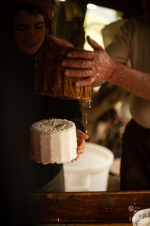 To ensure the quality of a workshop, ask the facilitator(s) / external trainer(s) to fulfill a document where they describe their session: its pedagogical purpose(s), the method used, the time amount of time they need, the pedagogical material needed, eventual prerequisite, etc.
That way you can organize yourselves from a logistical point of view, introduce the participants to the session and answer their questions.
To ensure the quality of a workshop, ask the facilitator(s) / external trainer(s) to fulfill a document where they describe their session: its pedagogical purpose(s), the method used, the time amount of time they need, the pedagogical material needed, eventual prerequisite, etc.
That way you can organize yourselves from a logistical point of view, introduce the participants to the session and answer their questions.
If you can afford it, it is recommended to give space for both formal and informal meetings between the participants and the social entrepreneurs who intervene. That way, the participants will benefit from a structured workshop (with a structured plan, precise data and detailed information on a specific topic) as well as from informal discussions that allow to connect in a more intimate way and mention other topics that raise their interest, ask the questions they want, or address more private topics.
Ideally, the social entrepreneurs / external trainers you invited to facilitate a session will stay a few days with the group, so that they can better understand the specificities of their audience, connect with each other and have time with them to discuss after the session. Most of them will probably not have the availability to stay very long (if they don't live on site), but feel free to ask! When it works, it usually proves successful.
Structured workshops (as described below) can be a great tool, but there is more! Another nice way to discover what is the life of social practitioners like is to work alongside them on something they currently need to do.
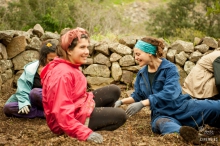 The activity may might not be the fanciest but it should be representative of their daily work. For example, we recommend weeding a plot in the field of a farmer, offering activities for children when visiting an alternative school, participating in carrying stones from a place to another or cleaning an old building in an emerging eco-village.
The activity may might not be the fanciest but it should be representative of their daily work. For example, we recommend weeding a plot in the field of a farmer, offering activities for children when visiting an alternative school, participating in carrying stones from a place to another or cleaning an old building in an emerging eco-village.
Those activities will demystify the concept of social innovation and its various branches. They will help the participants picture what it means in practice and to feel closer from the people who are taking action. They can also bring more cultural and political motives to light, and thus kindle inspiration.
After the session, support the participants in their effort to take the scope of their learning by proposing guidelines for reflection. Give space for personal reflection and propose a collective discussion from time to time to help the recognition of the acquired knowledge.
In a Heterotopia Tour, participants will also learn a lot from each other. They are going to meet people from different countries, of various ages, interests and habits, who all share the will to open up to new realities and people. Whatever their background, a stable characteristic between them all might be their need for learning and experimentation.
After the first days of ice-breaking, they get closer from each other, start to have more out of the context discussions, and open up to the others. It is at that time that their personal interests, hobbies, activities and practices come to light. They understand that they have a lot of things in common and that they can learn a great deal from the others.
The exchange of knowledge is the expected continuity of getting to know each other. After a while people might spontaneously grab the violin for the first time, make weird yoga poses, have walks to explore the surroundings or discuss about permaculture. You might witness a game from a specific country spreading among the camp with different people playing it each day, or a combined recipe in the making, while the cooks exchange tips. Likewise, it might happen that most of the participants gather in a specific spot of the nature around, spending hours discussing about topics that emerged from the activities of the day. There is something wonderful in the will of people that have more knowledge about a specific topic to talk about it as well as in seeing people that know nothing or less about this topic to listen with passion and make the most out of it.
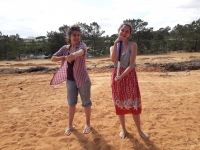 These exchanges of knowledge and know-how between participants are likely to occur spontaneously, from the initiative of some members of the group who are already used to sharing what they know and/or confident with their skills. Yet, some participants might find it difficult to pinpoint the skills they can share by themselves. You may have to help them acknowledge their own talents, they will then feel more comfortable with suggesting an extra activity for the group. For this purpose, we recommend to implement in the beginning of the Tour an activity that brings out the talents and interests of participants.
These exchanges of knowledge and know-how between participants are likely to occur spontaneously, from the initiative of some members of the group who are already used to sharing what they know and/or confident with their skills. Yet, some participants might find it difficult to pinpoint the skills they can share by themselves. You may have to help them acknowledge their own talents, they will then feel more comfortable with suggesting an extra activity for the group. For this purpose, we recommend to implement in the beginning of the Tour an activity that brings out the talents and interests of participants.
To make things easier, we also recommend to create a dedicated board for knowledge exchange where the participants can get organized to arrange mini workshops among them, either for one or more persons. The participants may mark down the title of the workshop they want to offer with a small description of it and its length, venue and the number of people who can join. Whoever is interested in a specific seminar/workshop will then write their name down.
These knowledge exchange activities are of great importance to a Tour. They answer the need of the participants to come get more intimate with others and to experiment with interesting activity not included in the official program of the Tour. In tune with the purpose of the Tour, they enable people from different places to come together and understand that they all have the same needs, concerns and impulses to experiment and live.
To allow this magic to happen, don't overload the day with activities and save time in the schedule. The participants will not be able to share between them if they are too tired or if there is no time for their bursts of spontaneity. Finding a balance won't be easy but if you keep thinking about it when designing the Tour, you should meet the challenge.
In addition to what was just said, you should never underestimate the power of a free day!
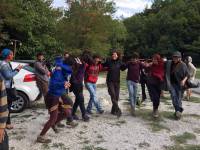 First of all, make sure that the participants are aware of the fact that they will get a free day without tasks, activities and instructions, this way in moments of exhaustion they know that they will have the opportunity to recharge.
First of all, make sure that the participants are aware of the fact that they will get a free day without tasks, activities and instructions, this way in moments of exhaustion they know that they will have the opportunity to recharge.
We suggest you to fit a free day each week, and no later than after 6-7 days. Usually, the energy level and motivation of participants is high for the first couple of days, because everything is new and exciting; but remember that this is also the period of adaptation for which they use a lot of energy to adjust to the environment, to the group, to find a routine and comfort in the non-comfort-zone. They will soon need a rest, a break from the dynamics, maybe some personal time alone, or space for discoveries that are not foreseen by the program.
The day after an intermediate evaluation can be an opportunity to insert the free day: participants can have a moment to breath after an emotional and energy-consuming activity. It can also break negative dynamics and put things into perspective: conflicts and problems that may feel heavy in an activity-setting can be eased just by “getting a break”.
A free day for the participants can be a good moment for the organizers as well to recharge their batteries, and also to double-check everything - logistics, finances, activities etc. - and to reorganize, if needed.
Never forget that the camp still has to be managed during this day. The free day can also become a moment of reflection, an opportunity to observe whether the camp is managed by the participants and responsibilities are taken without you assigning tasks, or not!
A Heterotopia Tour is also about discovering the context in which people are taking action, understanding what the local issues are and connecting them to global movements and concerns. To meet this objective, we recommend to plan specific activities for the participants to interact with the local community.
In order to connect participants with the local community and context, it is most recommended to join local events taking place during the Tour and take the participants to local venues that are typical of the identity of the area.
This will be an opportunity for the participants to:
On top of that, it will feed the participants' need to go outside of the camp for a few hours (especially if your Tour is long and takes place in remote areas), to have a drink, eat out, discover things their own way. It will also be an opportunity to enlarge the community of people they can interact with (out of the little community they are constantly part of since the beginning of the Tour).
At first, do a research ahead planning the activity program of your Tour and see what is scheduled in the surroundings for the period of the Tour: is there a fair, a forum on social economy, an eco-festival, a local music festival that you could join? Is there a venue which is typical from the area that you should visit to understand better the identity and dynamics of the place (for example an open-air market on which the people are gathering every day/week)?
Asking the local community (and especially your partners in the Tour) is probably the more efficient way to find relevant venues and events to join. Keep an eye too on local agenda and national or international days, like Earth Day, Bike-to-Work Day, etc. (here are some examples: https://en.wikipedia.org/wiki/List_of_environmental_dates): there might be an event related to it during your stay in the surroundings.
Decide then what could be relevant for the participants to experience: Would you like them to get immersed within the local community for a few hours and observe how people are living? to meet local social entrepreneurs, cooperatives, activists? to discover a wide range of social initiatives from here and there? If you decide to join an event dealing with social and collaborative economy, will you be only part of the audience or will you get involved in some way (as speakers during a talk, as volunteers to clean a place, organize a workshop, etc.) ?
Be open for opportunities, meanwhile checking if they fit (and to which extend) to your pedagogical and political objectives. Keep in mind that their will be linguistic and logistical issues. On one hand, it is most likely that the locals will mostly speak their native language on the event you intend to join; on the other hand, your participants can easily get lost in the city, enjoying their freedom and forgetting about the group and its needs… (you can read more about it under chapter 5.1 //"Practical arrangements and logistics//").
Take time before you go to explain to the participants what your objectives are (why you bring them there) and provide them guidelines (advices on what to pay attention to, questions to answer, small challenges to tackle during the day, etc.). The challenge will be to keep in line with the program's objectives while giving them space to discover what is at stake their own way. Managed well, this time out of the camp, within the local community, will be a key moment of your Tour.
* What are the purposes and contents of the public event?
A public event (or “Open House”) is a human crossroad, over which many questions can arise. It is a moment of interaction that has an educational, symbolic and emotional impact on both the participants and the people who join it. It is an opportunity to:
In practice, we believe it should include:
Design it according to your group's needs, your current resources, your audience and the circumstances on a local level. Reflect on what would be the activities that the people nearby will enjoy and how you can offer them insights towards knowledge and practice among equals. Don't forget the fact that they may not be used to what you intend to offer (it can be a newly addressed practice in the area) and that you should adapt the contents and the methods to them.
Be imaginative and adopt playful and interactive approaches to deal with serious concerns. For example, organize a public screening to address sustainability issues, that will be followed by discussions on ecology; call for people's imagination to re-design their area together and mark down on a collaborative map their personal views and considerations about the future; set a discussion between participants of the Tour and locals about practical solutions to fight rural depopulation; offer practical workshops with people involved in eco-communities, people working for water or waste management, local activists for seed-saving, etc.
* When should you organize it?
From our experience, we suggest you to organize at least two public events during a Tour:
In addition to the previously mentioned objectives of the event, the Final Event will be an opportunity to “look into the future”, spreading the results of the Tour among people who can contribute to sustain and bring forward the activities and outputs. You should therefore target members of the local community, other professionals and organizations working in the social field, and representatives of the media, decision- and policy-makers.
* How to reach and attract the local community?
First, find out which topics are of concern to both your group and the local community, so that the locals get interested your event. This should be done a long time before the Tour takes place, when designing it with the support of your local partners (who know the local context and people's concerns and habits).
Then, we suggest you to make a stakeholder analysis and to adequately choose the communication strategies (you can find support about it here: http://www.maghweb.org/lezione/module-3-stakeholder-analysis/).
Communicate about the event(s) in advance, even before the Tour starts, and make the invitations clear and attractive (by using good quality visual elements, colours, etc.). Publish in local newspapers, online media and public agendas; prepare a press release to be sent in various local media; create an event on Facebook; ask your partners and the people you get to know to spread the word within their community; plaster posters on public info-boards close to the venue and put aside some info leaflet (in people's native language) so the neighbors know who you are, what you do and when they can join you, etc. The more diversified and targeted your communication campaign will be, the more people from the local community may join your event.
* How to involve the participants in the organization of the event?
Generally speaking, the more the participants will feel included into the frame, the content and the organization of the event, the more they will get involved into it.
Get clear objectives in between your group from the beginning, describe the provisional program, complete it (if possible or relevant) with the participants' propositions and define what should be done from a logistical point of view (tasks to endorse before, during and after the event).
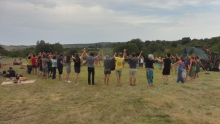 Introduce the event to them as a great opportunity for them to express their talents, share their knowledge with a wider community and strengthen their skills regarding facilitation, logistics and communication.
Encourage them to take initiatives (either it is about facilitating a session or about endorsing some responsibilities in the back-up as welcoming people from outside, taking care of the food or cleaning the common places and facilities) and support them in their effort to make it happen.
Introduce the event to them as a great opportunity for them to express their talents, share their knowledge with a wider community and strengthen their skills regarding facilitation, logistics and communication.
Encourage them to take initiatives (either it is about facilitating a session or about endorsing some responsibilities in the back-up as welcoming people from outside, taking care of the food or cleaning the common places and facilities) and support them in their effort to make it happen.
Make sure that they can enjoy the event as much as the people who will come from outside, because they have time to and because you took into consideration their need of translation (from your native language to another they can understand). Give them the speech as much as possible during the day and bring to light their knowledge and specific point of view on the topics you address with the locals.
* Additional tips for a successful implementation of the event
Evaluation moments during the Tour are essential to monitor the general well-being of participants, the group dynamics, the adequacy of the sessions and living environment and resources, and the learning process of participants.
Feedback should be given on a daily basis, for which we suggest to set up Base Groups, where participants can discuss and communicate their feelings about the day: what did they learn (about a topic or about themselves), what obstacles they have encountered, which opportunities they have discovered, what caused discomfort, how do they feel. (About the approach of the Base Groups see under Chapter 4 - Community living and group dynamic)
At the end of each step (about a week each), we strongly recommend you to organize an intermediate evaluation. Attention! Be flexible about the activity schedule during this day, because important issues can come up that need time to discuss and resolve. Sometimes mid-term evaluation can take up to a whole day.
We believe you should evaluate with participants at least the following aspects:
The participants will most likely not be used to speaking for themselves on such topics in front of other people. To help the process, we suggest you introduce them to the following guidelines:
Intermediate evaluation(s) is(are) an opportunity to change dynamics, strategies, methods and guidelines that are not functioning for the group and to introduce different ones that might be more efficient. We believe it is important to re-visit and evaluate the efficacy of those new methods and strategies though, after some days! (You can dedicate a moment during Base Groups for this evaluation, or wait the next collective evaluation).
For Final Evaluation and closing round you should also dedicate one whole day. The participants will need to have enough time to reflect on their learning achievements, on the difficulties they have faced, on the things they have discovered… Don’t rush them. They will also have a need for a “conclusion”, to share how they feel, to offer something for the group one last time, to say goodbye to each other and to celebrate what they have achieved.
Bring them back to the beginning of the project, and discuss with them about the whole journey they have gone through, till this last day. A sharing circle (see the description of the tool under Chapter 4 - Community living and group dynamic) might be a perfect tool for closing.
